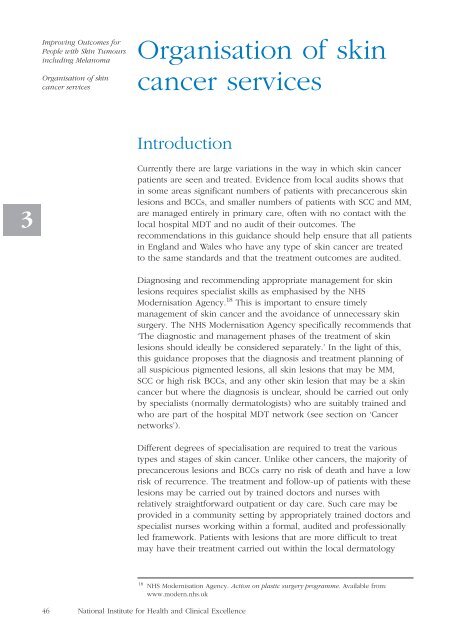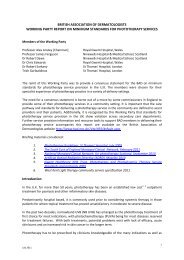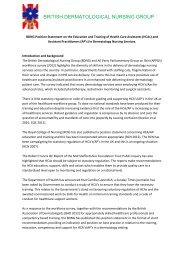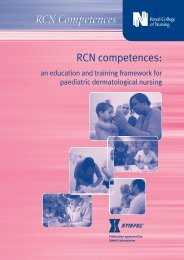Improving outcomes for people with skin tumours including melanoma
Improving outcomes for people with skin tumours including melanoma
Improving outcomes for people with skin tumours including melanoma
You also want an ePaper? Increase the reach of your titles
YUMPU automatically turns print PDFs into web optimized ePapers that Google loves.
<strong>Improving</strong> Outcomes <strong>for</strong><br />
People <strong>with</strong> Skin Tumours<br />
<strong>including</strong> Melanoma<br />
Organisation of <strong>skin</strong><br />
cancer services<br />
Organisation of <strong>skin</strong><br />
cancer services<br />
Introduction<br />
3<br />
Currently there are large variations in the way in which <strong>skin</strong> cancer<br />
patients are seen and treated. Evidence from local audits shows that<br />
in some areas significant numbers of patients <strong>with</strong> precancerous <strong>skin</strong><br />
lesions and BCCs, and smaller numbers of patients <strong>with</strong> SCC and MM,<br />
are managed entirely in primary care, often <strong>with</strong> no contact <strong>with</strong> the<br />
local hospital MDT and no audit of their <strong>outcomes</strong>. The<br />
recommendations in this guidance should help ensure that all patients<br />
in England and Wales who have any type of <strong>skin</strong> cancer are treated<br />
to the same standards and that the treatment <strong>outcomes</strong> are audited.<br />
Diagnosing and recommending appropriate management <strong>for</strong> <strong>skin</strong><br />
lesions requires specialist skills as emphasised by the NHS<br />
Modernisation Agency. 18 This is important to ensure timely<br />
management of <strong>skin</strong> cancer and the avoidance of unnecessary <strong>skin</strong><br />
surgery. The NHS Modernisation Agency specifically recommends that<br />
‘The diagnostic and management phases of the treatment of <strong>skin</strong><br />
lesions should ideally be considered separately.’ In the light of this,<br />
this guidance proposes that the diagnosis and treatment planning of<br />
all suspicious pigmented lesions, all <strong>skin</strong> lesions that may be MM,<br />
SCC or high risk BCCs, and any other <strong>skin</strong> lesion that may be a <strong>skin</strong><br />
cancer but where the diagnosis is unclear, should be carried out only<br />
by specialists (normally dermatologists) who are suitably trained and<br />
who are part of the hospital MDT network (see section on ‘Cancer<br />
networks’).<br />
Different degrees of specialisation are required to treat the various<br />
types and stages of <strong>skin</strong> cancer. Unlike other cancers, the majority of<br />
precancerous lesions and BCCs carry no risk of death and have a low<br />
risk of recurrence. The treatment and follow-up of patients <strong>with</strong> these<br />
lesions may be carried out by trained doctors and nurses <strong>with</strong><br />
relatively straight<strong>for</strong>ward outpatient or day care. Such care may be<br />
provided in a community setting by appropriately trained doctors and<br />
specialist nurses working <strong>with</strong>in a <strong>for</strong>mal, audited and professionally<br />
led framework. Patients <strong>with</strong> lesions that are more difficult to treat<br />
may have their treatment carried out <strong>with</strong>in the local dermatology<br />
18 NHS Modernisation Agency. Action on plastic surgery programme. Available from:<br />
www.modern.nhs.uk<br />
46<br />
National Institute <strong>for</strong> Health and Clinical Excellence















